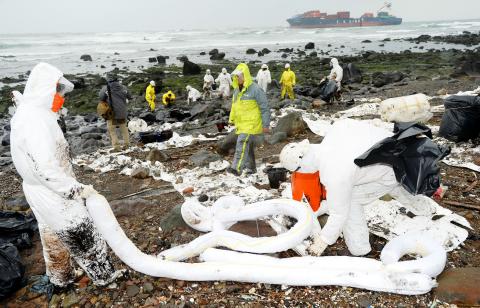A cargo ship that ran aground on shoals off New Taipei City’s Shihmen District (石門) on March 10 began leaking fuel on Thursday afternoon, polluting a 1.5km stretch of the northern coastline.
The ship, owned by TS Lines Co (德翔海運), started to split at about 5pm on Thursday, causing three shipping containers to fall off the deck, Coast Guard Administration captain Shen Wen-pin (沈文斌) said yesterday, adding that the cracks widened at about 6am, causing the ship to list 20 degrees as two more containers fell off.
The area around the ship has been designated off-limits due to the oil and falling containers, the Maritime and Port Bureau said.

Photo: Lin Cheng-shen, Taipei Times
The bureau said the ship was carrying 617 containers, among which were stored dangerous materials, such as 20 tonnes of potassium perchlorate, 18.2 tonnes of toluene, 19.5 tonnes of assorted fats, 8.5 tonnes of corrosive cleaning solutions and 6 tonnes of flammable lubricants, as well as low-to-medium-danger materials, such as 4.5 tonnes of air bags, 2.6 tonnes of car seat safety belts, 18.1 tonnes of epoxy and 11 tonnes of paint.
Rough seas have made it difficult to drain fuel from the ship, with rescue personnel only able to work on six days in the two weeks the ship has been stranded off Shihmen, the bureau said, adding that there are still 242m3 of oil in the ship’s tanks, as well as 37.5m3 of lubricant and 35m3 of wastewater.
It said that oil draining operations could resume tomorrow or on Monday at the earliest.
TS Lines said it had dispatched about 30 of its staff to the coast and set up oil booms.
The New Taipei City Government Bureau of Environmental Protection has mobilized crews to clean up after the fuel leak.
Fisheries Agency Director Wang Chao-hua (汪昭華) said orders were given to seal off the district’s Caoli and Shihmen ports on Thursday night and yesterday morning respectively, adding that the agency has deployed oil booms around the ports’ entrances as well as asking boat owners not to leave the ports.
National Kaohsiung Marine University professor Shen Chien-chuan (沈健全) called on the government to speed up cleaning efforts.
If cleaning efforts are inadequately handled, fuel particles could be absorbed by fish and seaweed, affecting fishing due to a polluted food chain, although the effects of the pollution would be minimized over time through ocean currents and waves, Shen said.
Shen said surfactants should be used to clean up oil on beaches, otherwise it would take two to three years for it to disperse naturally.
Additional reporting by Lu Hsien-hsiu and CNA

ACTION PLAN: Taiwan would expand procurement from the US and encourage more companies to invest in the US to deepen bilateral cooperation, Lai said The government would not impose reciprocal tariffs in retaliation against US levies, President William Lai (賴清德) said yesterday, as he announced five strategies to address the issue, including pledging to increase Taiwanese companies’ investments in the US. Lai has in the past few days met with administrative and national security officials, as well as representatives from various industries, to explore countermeasures after US President Donald Trump on Wednesday last week announced a 32 percent duty on Taiwanese imports. In a video released yesterday evening, Lai said that Taiwan would not retaliate against the US with higher tariffs and Taiwanese companies’ commitments to

Intelligence agents have recorded 510,000 instances of “controversial information” being spread online by the Chinese Communist Party (CCP) so far this year, the National Security Bureau (NSB) said in a report yesterday, as it warned of artificial intelligence (AI) being employed to generate destabilizing misinformation. The bureau submitted a written report to the Legislative Yuan in preparation for National Security Bureau Director-General Tsai Ming-yen’s (蔡明彥) appearance before the Foreign Affairs and National Defense Committee today. The CCP has been using cognitive warfare to divide Taiwanese society by commenting on controversial issues such as Taiwan Semiconductor Manufacturing Co’s (TSMC, 台積電) investments in the

‘SPECIAL CHANNEL’: Taipei’s most important tasks are to stabilize industries affected by Trump’s trade tariffs and keep negotiations with Washington open, a source said National Security Council Secretary-General Joseph Wu (吳釗燮) arrived in the US for talks with US President Donald Trump’s administration, a source familiar with the matter said on Friday. Wu was leading a delegation for a meeting known as the “special channel,” the Financial Times reported earlier. It marked Trump’s first use of the channel since returning to the White House on Jan. 20. Citing a source familiar with the matter, the Financial Times reported that Minister of Foreign Affairs Lin Chia-lung (林佳龍) was also a part of the delegation. The visit came days after China concluded war games around Taiwan and amid Trump’s

HELPING HAND: The steering committee of the National Stabilization Fund is expected to hold a meeting to discuss how and when to utilize the fund to help buffer the sell-off The TAIEX plunged 2,065.87 points, or 9.7 percent, to close at 19,232.35 yesterday, the highest single-day percentage loss on record, as investors braced for US President Donald Trump’s tariffs after an extended holiday weekend. Amid the pessimistic atmosphere, 945 listed companies led by large-cap stocks — including Taiwan Semiconductor Manufacturing Co (TSMC, 台積電), Hon Hai Precision Industry Co (鴻海精密) and Largan Precision Co (大立光) — fell by the daily maximum of 10 percent at the close, Taiwan Stock Exchange data showed. The number of listed companies ending limit-down set a new record, the exchange said. The TAIEX plunged by daily maxiumu in just